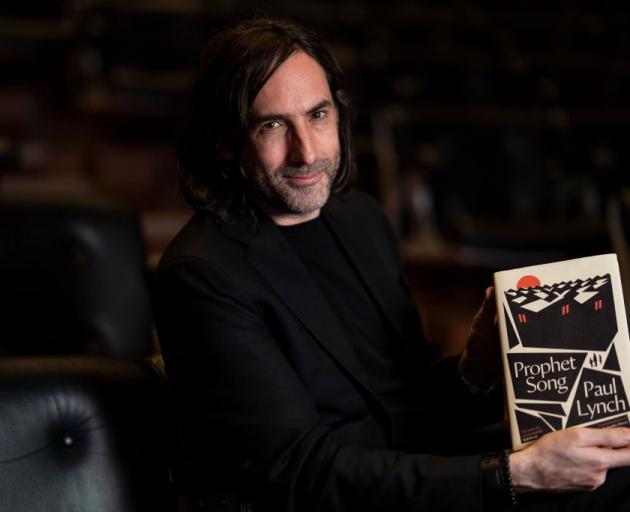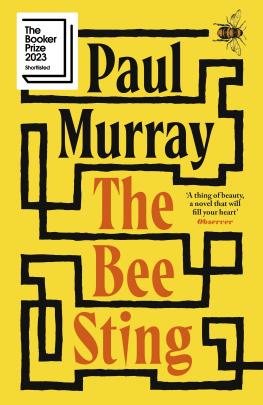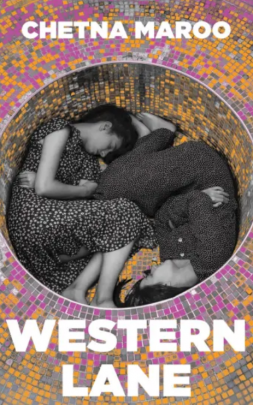The Otago Daily Times’ fiction buffs have reviewed the work of the six finalists in the 57th Booker Prize - stories from India to Ireland, gritty dystopia to family epic - and found a wide-open field.

Poignancy strikes chord in witty family drama
THE BEE STING
Paul Murray
Hamish Hamilton
REVIEWED BY ROB KIDD
At 650 pages, The Bee Sting is the heftiest of the shortlist by far, but its triumph is it never feels that long.
It flits seamlessly in scale between epic, covering such topics as love and climate change, to the intimacy and whimsy of a teenage girl’s diary.
Almost soap-opera-esque in its vicissitudes, the novel charts the lives of a prominent family in small-town Ireland.
Dickie Barnes is the owner of a once-thriving car dealership and his wife Imelda is widely regarded as a timeless beauty.
But beneath the veneer of success, their life of comfort is under threat.
The business is bleeding money and Dickie refuses to approach his father, the man who got the company off the ground, for help, despite the ongoing protestations and overt manipulations of his wife.
As their problems compound and control seems to ebb away, their children similarly drift.
Teenager Cass is struggling with the complex relationships of high school as she plans for university and 12-year-old PJ, with his love of science and history, increasingly retreats into the online world and the realm of his imagination.
While the book has received repeated praise for its comedy, it was its poignancy that struck a deeper chord.
Imelda, though seemingly superficial, has a tragic past which is revealed skilfully by author Paul Murray.
The narrative voice alternates between each family member and the author writes each with unique idiosyncracies that adds real texture.
Dickie’s decline features a hearty dollop of bathos and after so many pages, of course, there is the inevitable dramatic denouement.
As a climax, it did not disappoint, as the interchange of light and dark gives way to a definite blackness.
The Bee Sting is a fantastic story. I just don’t think it is quite worthy of the Booker.
- Rob Kidd is an ODT court reporter and books editor

Weighty themes, but clever construction
STUDY FOR OBEDIENCE
Sarah Bernstein
Allen & Unwin
REVIEWED BY CUSHLA McKINNEY
The nameless narrator of Sarah Bernstein’s slender but weighty novel is a cipher. Raised from infancy to serve her family and encouraged by her siblings “to suppress any hint of ambition or self-love as it arose”, her life is contingent on the whims of others, a projection of desire simultaneously needed and reviled. Summoned to her eldest brother’s service after the collapse of his marriage she finds herself in a cold, remote Northern country from which her Jewish ancestors, “obscure but reviled”, were brutally expurgated.
Regarded with intense suspicion by the local community and estranged by her inability to master the language, she slowly becomes attached to the place and its people, recognising that her brother’s dependence and her social exclusion (“a service undertaken in the interests of community cohesion’’) gives her the power to claim her place within it.
Glimpses of the narrator’s history are obliquely visible alongside contemporary events: repeated allusions to her family’s need to subdue her “uncommon pride and self-love”, her striving for goodness despite being marked by original sin, of a life of permanent and latent terror.
It is clear why the novel made the shortlist; its clever construction and weighty themes are hard to overlook. At one level it is the story of an abused woman extracting revenge by refusing to be broken. At another it is that of the Jewish people, her presence a reminder of the townsfolk’s complicity in her ancestor’s brutal eviction (a subject further complicated by current events).
The writing, which skirts the borders of interior monologue, is equally challenging. Discursive, multi-clausal half-page meanderings are punctuated by short, descriptive sentences, creating a musicality that feels almost 19th century in tone. Study for Obedience will infuriate some readers, enrapture others. Where I stand on this continuum I have yet to decide.
- Cushla McKinney is a Dunedin scientist

Family at heart of dystopian tale
PROPHET SONG
Paul Lynch
Oneworld
REVIEWED BY ROB KIDD
In the western world, a tyrannical government exercising a totalitarian regime is either the stuff of history classes or else at comfortable geographical arms length.
Paul Lynch sets this in modern-day Dublin and brilliantly explores the incremental abuse of power and the growing terror of civil war.
It begins when trade-unionist Larry is detained by a newly formed secret police, leaving his stricken wife Eilish to care for their four children, including a baby.
As the realisation dawns that the situation is deteriorating and the likelihood of his return is increasingly bleak, Eilish faces the impossible choice: cut her losses and leave with the kids, accepting the inevitable, or maintain a futile and ever-dwindling hope that things will improve.
It is dystopian but not in the exaggerated, sci-fi style some readers may be used to.
This is painfully realistic and overwhelmingly claustrophobic in its telling.
The absence of paragraph breaks and speech marks crams the text on the page, mirroring Eilish’s stifling experience.
As her children are all affected differently - some drawn into the resistance, others into extreme behavioural changes - her desperation grows and her autonomy slips away.
However, it is testament to Lynch’s skill that the gloomy futility of her actions never gives way to predictability. You will be on the edge of your seat for so long that you will be numb.
As the state of the conflict gnaws away at people’s civil liberties, there are heartbreaking decisions to be made.
Some of the scenes in the latter stages of the Prophet Song are immensely powerful as Eilish navigates a war zone, desperately trying to find her child.
While the narrative itself is propulsive, Lynch does not rely on that alone, there is beautiful prose woven through the devastation.
This is my favourite for the prize, and apparently, for what it’s worth, the bookies agree.

Gothic vibes of good and evil
THIS OTHER EDEN
Paul Harding
Hutchinson Heinemann
REVIEWED BY JESSIE NEILSON
This magical, atmospheric novel is set on Apple Island, Maine, in 1912. Though fiction, this work is inspired by the mixed race community which settled on Malaga Island, primarily in the 1800s. In its soaring narrative, pulled towards myth, and dark, southern, gothic vibe it is in the territory and league of Donna Tartt and Barbara Kingsolver. From the opening paragraph the reader is drawn back into earlier centuries, into the characters' flight and settlement and an elemental world of good and evil.
As Harding reimagines it, one Benjamin Honey, now a freed slave, lands here with his Irish wife, Patience. With him, Benjamin carries pockets of seeds, the beginnings of an extensive apple orchard. His children grow up where at night the ‘‘iridescent, ocean-bent sunset light, the greens and purples’’ would deepen from their ‘‘radiant flat day-bright into catacombs of shadowed fruit and limb and leaf’’. An Eden to which to return.
Generations later, great grand-daughter Esther Honey sits in her cabin with grandchildren upon her lap. She spins tales of the 1815 New England hurricane (‘‘The Great September Gale’’) and of floods of biblical proportions. This humble outpost in the Atlantic is otherwise little disturbed, its few people carpenters and fishers and crafters. However, on the mainland, others are offended by this insular community which, without outsiders, has bred among itself. The inhabitants, with names like Zachary Hand To God Proverbs and Rabbit Lark, display some deformities, have had no formal education, and are of mixed blood. Something must be done about these ‘‘problem children’’, and with increasing debates on eugenics come the government representatives.
Harding stays far back from the novel, and omniscient narrators share the intonating with local storytellers. The realistic merges with the exaggerated, creating bountiful visions. A sumptuous treat, with menacing historical undertones.
Jessie Neilson is a University of Otago library assistant

Drifting through emotional dysfunction
IF I SURVIVE YOU
Jonathan Escoffery
4th Estate
REVIEWED BY LAURA BORROWDALE
There is always a storm coming in If I Survive You. Sometimes it’s a literal storm, the kind that destroys neighbourhoods, and others, it is an emotional one as the book follows Trelawney, the second son of immigrant parents, trying to establish his place in his family and in the world.
Part of a Jamaican-American family living in Florida, he searches for a place to stand, distinct from others. In a book deeply about displacement and the damage of losing your roots, it seems the best word for what Trelawney is looking for is not an English one, but rather a Māori one: his tūrangawaewae. He says, “Of course, the difference between exiles and my parents - in fact, the difference between me and my parents - is that my parents have a homeland to which they can return.”
If I Survive You presents a world of dysfunctional relationships, casual racism and chronic employment issues. This is a world where women walk out on men and men walk out on their children. How do we deal with, move past or survive the damage that has been done to us? Jonathan Escoffery presents cycles of intergenerational abandonment and the desperation of little boys who want “to be caught up in the love that linked the men of my family”, but who never seem to gain it.
It has been described as a collection of linked stories, and it could be read this way. However, it is more satisfying to see it as a longer narrative as each story adds detail to a larger picture.
The only problem with the structure is that there is no real sense of the kind of climax you would get in a true novel, and rather no real resolution to a longer narrative. The story ultimately drifts, much like Trelawney, episodic and fragmentary.
- Laura Borrowdale is a writer, educator and former Dunedin resident

Grief takes family on a turbulent journey
WESTERN LANE
Chetna Maroo
Picador
REVIWED BY JESSIE NEILSON
Gopi is 11 years old when her mother dies, the youngest of three girls. They live in London with their heartbroken father, speaking Gujarati at home and finding comfort in expansive Indian dishes. Gopi's Aunt Ranjan believes it is not too late to save the girls from turning wild and, with her encouragement, they enter years of discipline.
Outside of school hours Gopi is always on the squash courts, driven on by her father. The sounds from neighbouring courts ricochet around her body and mind, into her nerves and bones. She has a heightened awareness to the presence and actions of others, as well as to the grades of light and sound. Balls hit clean and hard like a pistol shot, then echo.
From a first-person perspective, Gopi describes her daily life through the ongoing despondency which swamps her family. Her father is an ever-silent being, except when enthusing on squash stars of the past. Also, on the court he becomes a ferocious competitor. While he slowly integrates back into communal living, Gopi observes familial interactions, the slights, the hurts, and the quiet expressions of love and care. Her mother's presence is always there as the family members go through different reactions to grief.
On the surface there is little action or narrative drive to this novel. Other than Gopi's close-knit family there are few friends, and outside the squash courts there is meagre fun or free time. This novel is about the plays beneath the surface, and the constant fluxes of emotion. Senses and sensations lead to knowledge.
Western Lane does not leave a dramatic impression but instead absorbs the reader through understatement. It is a quiet look at how grief unfolds for a migrant family, and the obsession and ambition which is used to plug these wounds.


















